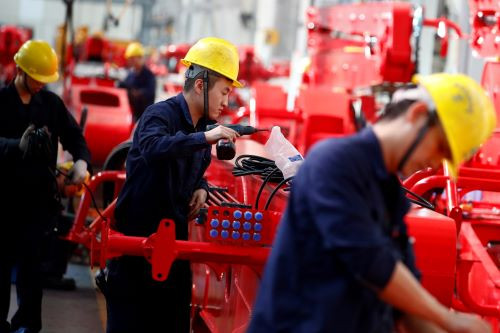On Monday, Asia's stock markets were uneven after China revealed that its economy expanded at an annual rate of 8% last year, albeit growth dropped to half that rate in the last three months.
In Tokyo, the Nikkei 225 index was marginally higher by 0.7% after the government stated that factory orders increased in November because of increased private investment as the country contains the number of pandemic cases.
The Shanghai Composite index increased by 0.5%, while the Hang Seng index in Hong Kong fell by 0.7 percent.
Growth slowed to a one-and-a-half-year low in the third quarter, government statistics showed, only days after the central bank acted to shore up the economy by cutting a key lending rate for the first time since early 2020.
The world's second-biggest economy is grappling with a fast cooling real estate market and intermittent COVID-19 outbreaks that threaten its companies and supply lines.
In a marked policy divergence from other major countries, the People's Bank of China cut the rate at which it lends one-year money to banks by 10 basis points - the first cut since April last year.
While inflation is the primary concern of central bankers in the United States and Europe, China's relatively stable prices have switched policymakers' focus to growth.
Official figures released Monday revealed that gross domestic product increased 4% year over year in the third quarter, the slowest pace since early 2020.
"Economic momentum remains sluggish in the face of recurring viral outbreaks and a failing property industry," Capital Economics' Julian Evans-Pritchard told Market Watch. He anticipates that China's legislators would keep lending limitations reasonably tight and credit expansion under control.
Meanwhile, several Chinese cities have increased their security precautions ahead of the Lunar New Year holiday travel season, since the Omicron strain has spread to new places, including the capital Beijing.
The economy expanded by 8.1% in 2021, above forecasts of 8.0% and significantly exceeding the government's aim of "above 6%" and 2020's revised growth of 2.2%.
In December, housing sales remained sluggish, while consumer spending dropped significantly as the government strengthened virus control measures.
Sentiment will be further dampened by an epidemic of omicron-variant virus cases in January, notably in Beijing over the weekend.
China's GDP increased by 4% in the fourth quarter, the National Bureau of Statistics (NBS) reported, faster than predicted but still the worst pace since the second quarter of 2020. Third-quarter growth was nearly 5%.
Goldman Sachs Group Inc. warned Thursday that the central bank may enable banks to cut the five-year loan prime rate, which serves as a benchmark for mortgages.





